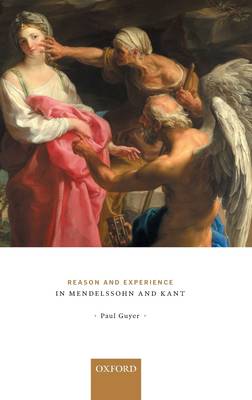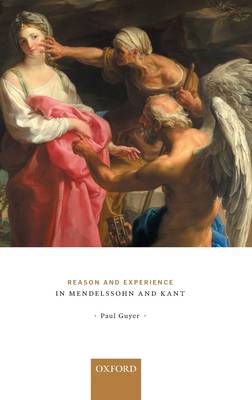
- Retrait gratuit dans votre magasin Club
- 7.000.000 titres dans notre catalogue
- Payer en toute sécurité
- Toujours un magasin près de chez vous
- Retrait gratuit dans votre magasin Club
- 7.000.0000 titres dans notre catalogue
- Payer en toute sécurité
- Toujours un magasin près de chez vous
140,45 €
+ 280 points
Description
Reason and Experience in Mendelssohn and Kant provides the first in-depth examination of the lifelong intellectual relationship between two of the greatest figures of the European Enlightenment, Immanuel Kant (1724-1804) and Moses Mendelssohn (1729-1786). Both were engaged in a common project
of striking the right balance between rationalism and empiricism. They sometimes borrowed from one another, often disagreed with one another, and can usefully be compared even when they did not directly interact. Guyer examines a series of comparisons and contrasts: their arguments and conclusions
on a range of metaphysical issues, including proofs of the existence of God, immortality, and idealism; their shared interests in aesthetics; and their path-breaking work on the religion of reason and the separation of church and state. Setting the work of both philosophers in historical context,
Guyer shows that, where Kant sometimes provides deeper insight into the underlying structure of human thought, Mendelssohn is often the deeper student of the variety of human experience. This is evident above all in their treatments of aesthetics and religion: Mendelssohn recognizes more deeply than
Kant the emotional impact of art, and while Kant imagines that organized religion will one day be superseded by pure morality, Mendelssohn argued that organized religion in all its varieties seems here to stay, and so toleration for religious variety is an inescapable requirement of human morality.
Based on an exhaustive study of a wide range of texts, this study demonstrates the on-going relevance of Kant and Mendelssohn to modern thought.
of striking the right balance between rationalism and empiricism. They sometimes borrowed from one another, often disagreed with one another, and can usefully be compared even when they did not directly interact. Guyer examines a series of comparisons and contrasts: their arguments and conclusions
on a range of metaphysical issues, including proofs of the existence of God, immortality, and idealism; their shared interests in aesthetics; and their path-breaking work on the religion of reason and the separation of church and state. Setting the work of both philosophers in historical context,
Guyer shows that, where Kant sometimes provides deeper insight into the underlying structure of human thought, Mendelssohn is often the deeper student of the variety of human experience. This is evident above all in their treatments of aesthetics and religion: Mendelssohn recognizes more deeply than
Kant the emotional impact of art, and while Kant imagines that organized religion will one day be superseded by pure morality, Mendelssohn argued that organized religion in all its varieties seems here to stay, and so toleration for religious variety is an inescapable requirement of human morality.
Based on an exhaustive study of a wide range of texts, this study demonstrates the on-going relevance of Kant and Mendelssohn to modern thought.
Spécifications
Parties prenantes
- Auteur(s) :
- Editeur:
Contenu
- Nombre de pages :
- 364
- Langue:
- Anglais
Caractéristiques
- EAN:
- 9780198850335
- Date de parution :
- 27-07-20
- Format:
- Livre relié
- Format numérique:
- Genaaid
- Dimensions :
- 155 mm x 236 mm
- Poids :
- 698 g

Les avis
Nous publions uniquement les avis qui respectent les conditions requises. Consultez nos conditions pour les avis.






